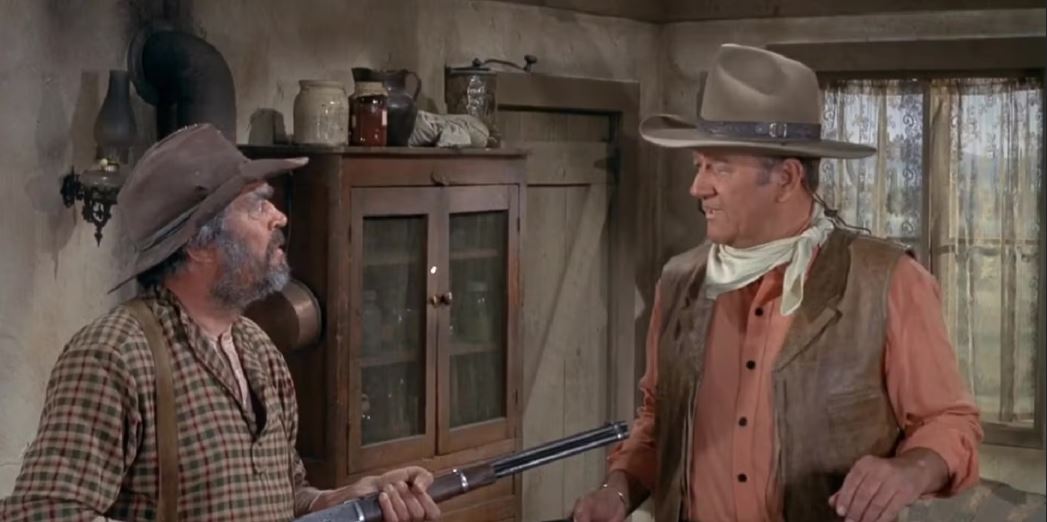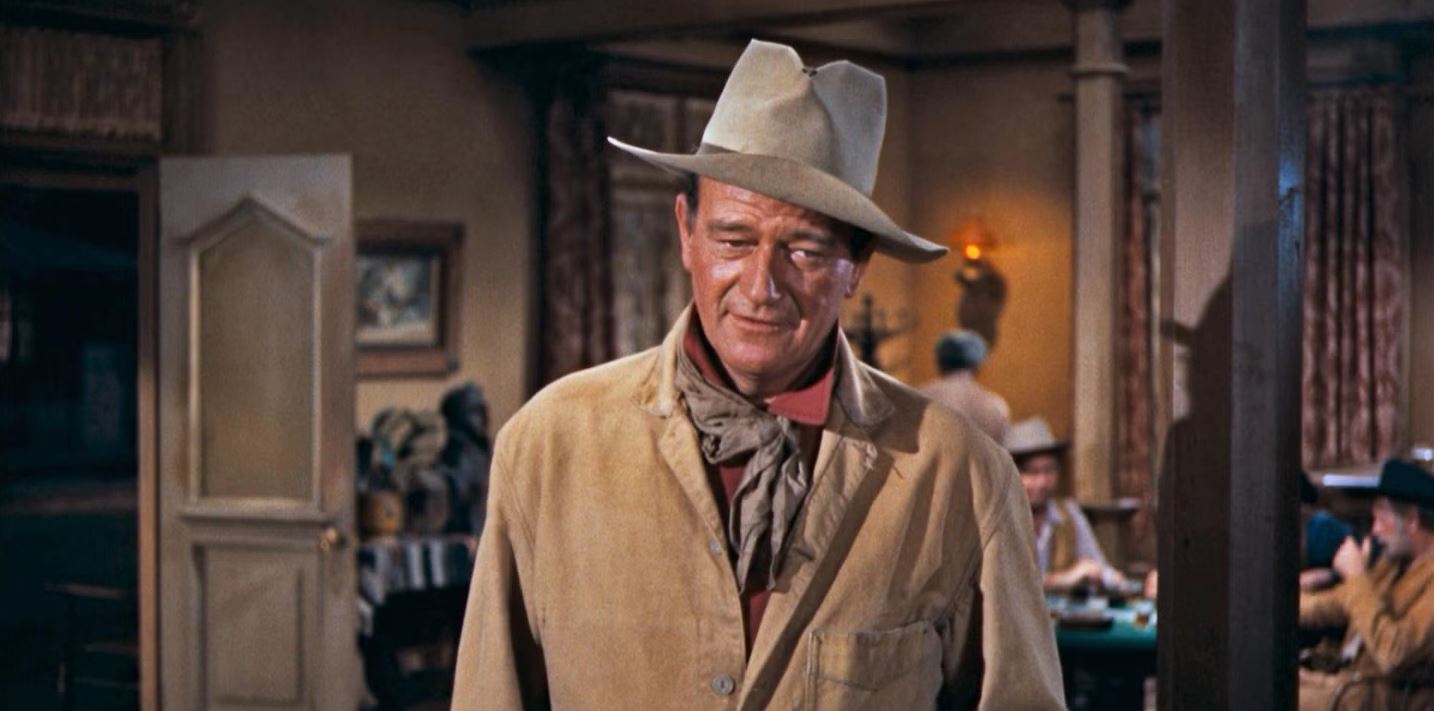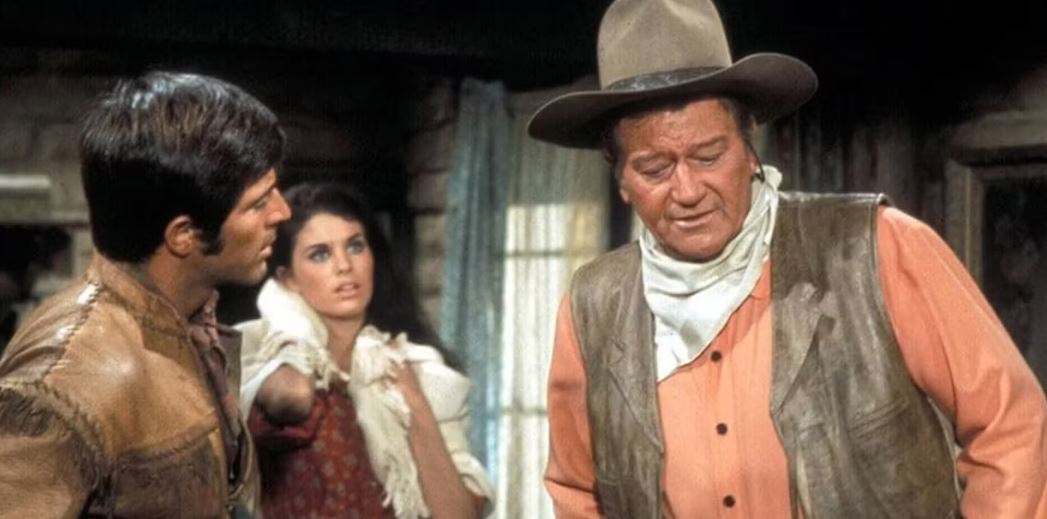Rio Lobo marked the end of an unofficial John Wayne trilogy, and has come to be regarded as one of his most underrated Westerns. John Wayne fronted 80 Westerns throughout his long career and starred in them right up until his final film, The Shootist. The 1970s was a grim time for the genre because outside of Wayne or Clint Eastwood, the popularity of the Western was on a downward trajectory in terms of box office. Many of Wayne’s final efforts in the genre weren’t up to the quality of his earlier work either.
The likes of Cahill U.S. Marshal and Wayne’s only sequel Rooster Cogburn were lame efforts, though The Shootist was a great note to close his career on. Franchises might dominate studio filmmaking now but for the stars of Hollywood’s “Golden Age,” sequels used to be an offensive term. This may explain why Wayne only has one genuine sequel to his name, though the unofficial Rio Bravo trilogy saw the star and director Howard Hawks riff on the same basic story and characters three times.
What John Wayne’s Rio Lobo Is About

This 1970 Western Is Essentially Rio Bravo 3
According to Roger Ebert’s review of Rio Lobo (via RogerEbert.com), when Hawks offered to send his leading man the movie’s screenplay, Wayne quipped “Why bother? I’ve already made the movie twice.” That might be a tongue-in-cheek comment, but it’s not inaccurate either. Rio Lobo cast Wayne as a Union cavalry officer named McNally who chases down the traitors who aided Confederates with a train robbery. This trail leads to the titular lawless town, where McNally and his allies (including Jack Elam’s Phillips) enact justice.
In terms of plotting, Rio Lobo is doing nothing fresh or innovative. The film is a greatest hits package for both Wayne and Hawks, though the film does make concessions for its leading man’s age. He no longer romances the female lead, and the more physical action is left to his younger co-star, Jorge Rivero. Still, he’s very much the star, with McNally driving the story as he chases the traitors and forms up a ragtag team of allies around him – not unlike how things work in Rio Bravo.
How Rio Lobo Ended A John Wayne Western Trilogy

Rio Lobo Was The End Of An Era In Several Ways
Somebody who isn’t a fan of this particular John Wayne Western is Quentin Tarantino. In fact, Tarantino cited films like Rio Lobo as the reason he wants to retire, stating it’s a prime example of a great director staying on the job too long and losing his touch. He’s not totally wrong, with the film being one of Hawks’ weakest films and lacking any real sense of urgency. Still, that’s the reason some genre devotees are drawn to Rio Lobo these days; just like Rio Bravo and El Dorado, it’s a fun hangout movie.
The 1970 adventure has the shootouts and horse chases expected, but much of it revolves around Wayne getting to know his new friends. The Rio Bravo trilogy honed in on the same themes and characters; McNally is essentially the same guy as Rio Bravo’s John T. Chance or El Dorado’s Cole Thornton, while the film once again sees his character mentoring a cocky younger gunfighter. Elam steals the show as Phillips, who is very much in the vein of Walter Brennan’s Stumpy.
The Rio Bravo trilogy is really a series of remakes, with each offering subtle remixes of the same ingredients.
All three feature a siege on a jailhouse and close with Wayne’s gang having a gunfight with the evil rich villain and their henchmen. The Rio Bravo trilogy is really a series of remakes, with each offering subtle remixes of the same ingredients. Sadly, Rio Lobo marked the end of Hawks’ directing career, with the film grossing less than its $6 million budget at the box office.
Why Rio Lobo Is One Of John Wayne’s Most Underrated Westerns

Rio Lobo Lets Wayne Do His Thing
Rio Lobo’s reputation isn’t so hot. Whereas Rio Bravo is dubbed a classic while El Dorado is the slick, faster-paced remake, the consensus around Hawks’ final offering is that it’s a leaden slog. Wayne was considered too old for the lead, while Jorge Rivero is a step down from co-stars like Dean Martin and Robert Mitchum in terms of charisma. All of these critiques are fair, but in the film’s defense, it’s still a fun ride with the right mindset.
The film is too laidback for its own good, but those who get on board with Rio Lobo’s deliberate pacing are going to enjoy themselves. Like its predecessors, it’s best viewed as a hangout Western, where it’s about the vibes and characters just as much as the shootouts. As Ebert pointed out in his positive review, it also marked the first, old-fashioned Wayne Western in some time, following more subversive offerings like True Grit. Rio Lobo certainly isn’t the best example of the star’s work, but then it never really set out to be.
